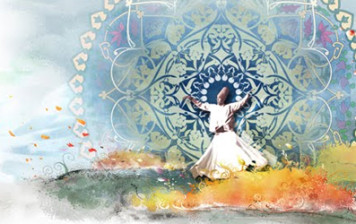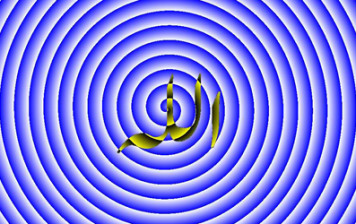
Lester R. Kurtz
Born into an Anatolian village family of considerable spiritual fervor within the Muslim tradition, Fwethullah Gülen’s parents raised him with a pervasive spiritual perspective on life. Gülen recalls that his mother “taught the Qur’an to all the village women and me at a time when even reciting Qur’an was prosecuted.”[1] It is possible that the rural environment of his childhood facilitated the life of prayer and meditation that marked his adulthood. “A pleasant silence and calm always dominated the old villages,” he remembers.
The morning sunlight, the mewing of sheep and lambs, and the cries of insects and birds would strike our hearts in sweet waves of pleasure and add their voices to the nature’s deep, inner chorus.
In this world – the next-door neighbor to the next world – the call to prayer and the prayer litanies, the language of the beyond would call us to a different concert and take us around in a deeper and more spiritual atmosphere.[2]
He memorized the Qur’an at a young age and testifies that he “began praying when I was 4 years old, and have never missed a prayer since.”[3] He dedicated himself early on to a simple lifestyle devoted to prayer, meditation, religious writing and teaching. Eschewing family life he chose an ascetic’s path devoting his life to prayer and religious pursuits and owning virtually no possessions. His ubiquitous writings cover a wide range of spiritual topics from questions put to the faith by the modern world to basic introductions to the teachings of Islam and Muhammad.[4]
Gülen’s work in Turkey was notable in that it was highly religious in a secularized context as well as apolitical in a highly politicized environment.[5] In this national context – as well as an international environment in which Islamic and other religious rhetoric took on the character of diatribe and ideological denunciations of others as infidels and traitors – Gülen managed to move back and forth between the religious and the secular, between the Islamic and the non-Islamic, promoting his Sufi-inspired emphasis on love of humanity and the compatibility of Islam with “modernity, democracy, and progress.”[6]
The Sufi Solution
One of the keys to Gülen’s ability to combine commitment and tolerance is his emphasis on Sufism as the spiritual side of Islam, or its “inner life.” [7] It is not surprising that Gülen’s vision of the Islamic tradition has a strong Sufi flavor – as that has been characteristic of much of Turkish Islam in general.[8]
Islam is seen as having various spheres – the institutional, the political, the personal, the spiritual, etc. The spiritual is viewed as the most important and equated with the widespread mystical tradition of Sufism. Because of these spheres, the Muslim path leads to a kind of openness to others that the institutional aspect of the faith cannot embrace. Whereas it is an institution’s task to set up boundaries and emphasize difference, it is a spiritual tradition’s task to open up the heart to a force that obliterates difference. From the height of spiritual experience the boundaries disappear in the same manner that national boundaries on earth become invisible when the planet is viewed from the moon. It is this aspect of Islam that Gülen highlights in his ubiquitous writings and lectures on the basis of the faith.
Spiritual practice and morality are, for Gülen, more important than ritual and dogmatism, an attitude that opens the way for dialogue with other faith traditions. The Sufi emphasis on love as a central attribute of a believer shifts the focus from institution and ritual to the diffusion of love for God and for others. Gülen insists that “Love is the most essential element in every being, and it is a most radiant light and a great power which can resist and overcome every force.”[9] Out of this burning passion comes an affection for the entire universe that minimizes the differences of creed. If you have the characteristics of a believer, “Whether you’re a Christian, a Jew, a Buddhist, or of another creed, you’re carrying a believer’s attribute.”[10]
As in the Sufi tradition, Gülen asserts that “believers are people of enthusiastic love; in fact, more of a pole of attraction.” Gülen refers to the metaphor of the famous Sufi poet Mawlana Rumi to explain how one can be both rooted one’s own tradition but open to others:
Using Rumi’s expression, such a person is like a compass with one foot well-established in the center of belief and Islam and the other foot with people of many nations. If this apparently dualistic state can be caught by a person who believes in God, it’s most desirable. So deep in his or her own inner world, so full of love so much in touch with God; but at the same time an active member of society.[11]
This Rumi-inspired duality of one foot in his own faith tradition while the other roams freely to the faiths of others is a starting point for Fethullah Gülen ‘s emphasis on dialogue.
The Theory and Practice of Dialogue
Interfaith dialogue is a must today, and the first step in establishing it is forgetting the past, ignoring polemical arguments, and giving precedence to common points, which far outnumber polemical ones. — Fethullah Gülen[12]
Gülen’s form of Islam begins with tolerance but it does not end there – what is more surprising than his advocacy of tolerance is the extent to which he acts on that principle. It is, in fact, his concrete actions in the implementation of dialogue that have attracted widespread attention to his efforts to define Islam as a force for peace. Most significantly, he initiated dialogues with Christians and Jews, as well as secular intellectuals and civic leaders in Turkey. Eventually he expanded beyond his own national borders to a celebrated meeting with the Roman Catholic Pope John Paul II and Israel’s Sephardic Head Rabbi Eliyahu Bakshi Doron.
It is not difficult to see why Gülen was able to obtain and sustain such a reputation for dialogue if we look at what he considers to be the “pillars of dialogue:’ love, compassion, tolerance and forgiving.”[13] Such attitudes provide the foundation for Gülen’s method of dialogue. He begins with love, which he claims is “the most essential element in every being, a most radiant light, a great power that can resist and overcome every force.”[14] He then moves on to compassion, claiming that “the universe can be considered as a symphony of compassion” and that a “human being must show compassion to all living beings, for this is a requirement of being human.”[15]
The final pillars are tolerance – “so broad we can close our eyes to others’ faults” – forgiveness, which together “will heal most of our wounds.”[16] They are basic principles Gülen finds in the Qur’an. He notes that the Qur’an instructs believers not to respond to meaningless and ugly words or behavior with similar words, but to pass by in a dignified manner, as the prophet himself did, showing tolerance and forgiveness even to his bitter enemies. In this sense, it is because of his commitment to Islam, rather than despite of it, that Gülen advocates tolerance toward others.
Muslims are bodyguards of love and affection, who shun all acts of terrorism and who have purged their bodies of all manner of hate and hostility. — Fethullah Gülen[17]
Because of Fethullah Gülen’s emphasis on love of humanity as characteristically Muslim and a sign of spirituality, he does not hesitate to condemn terrorism unequivocally and to set himself – and Islam – apart from acts of terrorism. “God’s Messenger preached Islam, the religion of universal mercy,” Gülen notes. “However, some self-proclaimed humanists say it is ‘a religion of the sword.’ This is completely wrong.”[18]
In an effort to set the record straight, as he saw it, Gülen made a strong public condemnation of terrorism following the September 11th attacks on the World Trade Center and the Pentagon in a letter to the Washington Post, in which he insisted
I would like to stress that any terrorist activity, no matter who does it and for what purpose, is the greatest blow to peace, democracy, humanity, and all religious values. For this reason, no one-and certainly no Muslims-can approve of any terrorist activity. Terror has no place in one’s quest to achieve independence or salvation. It costs the lives of innocent people.
Although some will always exploit religion for their own interests, he boldly goes on saying: Islam does not approve of terrorism in any form. Terrorism cannot be used to achieve any Islamic goal. No terrorist can be a Muslim, and no true Muslim can be a terrorist.[19] He could not have been more blunt and yet he further explains that Islam does not allow the violation of individual rights, even for the community’s interests, and that ‘the Prophet Muhammad says that a Muslim is one who does no harm with his or her hand or tongue.”
Gülen’s compassion, it should finally be noted, extends not only to all of humanity, but also to Creation itself. One member of the Gülen movement told me of a time when he was camping with a group of young men inspired by him. When a snake was found entering the camp and was immediately killed by one of those with him, Gülen expressed deep sorrow at its death and fasted for three days in repentance, even though he was not the person directly responsible.
Similarly, in one of his volumes on the prophet Muhammad, Gülen recalls a story in which the prophet reproached one of his companions for deceiving his horse, saying, “You should give up deceiving animals. You should be trustworthy even in your treatment of them!”[20]
If humanity is to survive another century – and the twenty-first is beginning to appear capable of surpassing the records of violence of its predecessor – voices from the faith communities like those of Fethullah Gülen will no doubt play a role. His perspective is most notable because it comes from one of the two traditions most frequently called upon to legitimate the violence that pervades human politics, the Christian and the Muslim. Perhaps his innovations in cultural paradox will inspire others to help us find a way out of our global conundrum.
Source:
Summarized from “Gülen’s Paradox: Combining Commitment and Tolerance” by Lester R. Kurtz, published on The Muslim World, Special Issue, July 2005 – Vol. 95 Issue 3 Page 325-471
References:
[1] Quoted in Ali Ünal and Alphonse Williams, eds., Advocate of Dialogue (Fairfax Virginia: The Fountain, 2000), 10
[2]ibid., 11. Quoted and translated from Fethullah Gülen, Zamanin Altin Dilimi(The Golden Slice of Time) (Izmir, 1994).
[3]Ibid., 13. Quoted and translated from Fethullah Gülen, Küçük Dünyam (My Small World). Interviewed by Latif Erdogan, Zaman.
[4] See, e.g., M. Fethullah Gülen, Prophet Muhammad: The Infinite Light. 2 vols. (London: Truestar, 1995, 1998) and three volumes translated into English published in the United States in 2000 by The Fountain (in Fairfax, Virginia): Essentials of the Islamic Faith, Questions and Answers About Faith, and Key Concepts and the Practice of Sufism.
[5] See Lynne Emily Webb’s work, Fethullah Gülen: Is There More to Him than Meets the Eye? (Izmir, Turkey: Mercury International Publishing, Consulting, Import and Export Ltd., n.d.) which outlines the series of military coups and trends in modern Turkey that provide the crucible in which his spiritual perspective is formed.
[6] Comments by Turkish prime minister Bülent Ecevit in Eyup Can’s “A Tour of the Horizon,” Istanbul, 1996.
[7] See the interview with Gülen in Ünal and Williams, op. cit., 358. Said Nursi (1876-1960) was an influential Turkish intellectual who promoted interfaith dialogue long before it became popular.
[8] See Bulent Aras and Omer Caha, “Fethullah Gülen and His ‘Liberal Turkish Islam’ Movement.” Middle East Review of International Affairs 4 (2000). Available 2 December 2002 at http://meria.idc.ac.il/journal/2000/issue4/jv4n4a4.html. Aras and Caha note that “The main premise of “Turkish Islam” is moderation and that the Sufi-oriented Islamic movements influenced Turkish political history even during the reign of the Ottomans when the political system accepted a multi-religious state, “in which Christian and Jewish subjects would continue to be governed by their own laws.”
[9] M. Fethullah Gülen, “A Voice of Love: Love” Available at www.fgulen.org/articles/love.html 7 December 2002. Also in Gülen’s Toward the Lost Paradise, available 1 September 2003 at http://www.fethullahgulen.org/lostparadise/tlppg12.html.
[10] Ibid., 207. Quoted in and translated from Nevval Sevindi, “Fethullah Gülen Ile New York Sohbeti,” Yeni Yuzyil, August 1997.
[11] Ünal, Ali and Alphonse Williams. Advocate of Dialogue: Fethullah Gülen. (Fairfax: The Fountain, 2000) p. 207.
[12]Ibid., 244
[13] Ünal and Williams, op cit.,253.
[14]Ibid.
[15]Ibid.
[16] For Gülen’s ideas on the ideal human, see Fethullah Gülen. Toward a Global Civilization of Love and Tolerance. (New Jersey: Light, 2004) pp. 81-130.
[17] Fethullah Gülen , “True Muslims Cannot Be Terrorists,” Pp. 95-100 in The Fountain, op. cit., 100. originally an article in the Turkish Daily News, 19 September 2001.
[18] Fethullah Gülen, “Islam as a Religion of Universal Mercy,” Pp. 44-50 in The Fountain, op. cit., 45.
[19]Ibid.
[20] Fethullah Gülen , Prophet Muhammad, 94; originally from al-Bukhari, Iman 24.
Tags: Dialogue | Sufism |Related Articles

Rumi and Gülen’s Main Message and Acceptance of the Other
Although Rumi lived about 800 years before Gülen, they both lived in cosmopolitan environments and thus both made intercultural dialogue their main tool of social innovation and conflict…

An analysis of Gülen’s Humanism
Heon Kim Gülen’s perception of humanism is at the heart of his thought, so much so that it serves as the reason for the existence and activities of the…

Can the Gülen Movement be characterized as a Sufi order?
Doğu Ergil Can the Gülen Movement be characterized as a Sufi order? Is it possible to call it a Sufi order considering the teachings regarding the spiritual realm…
